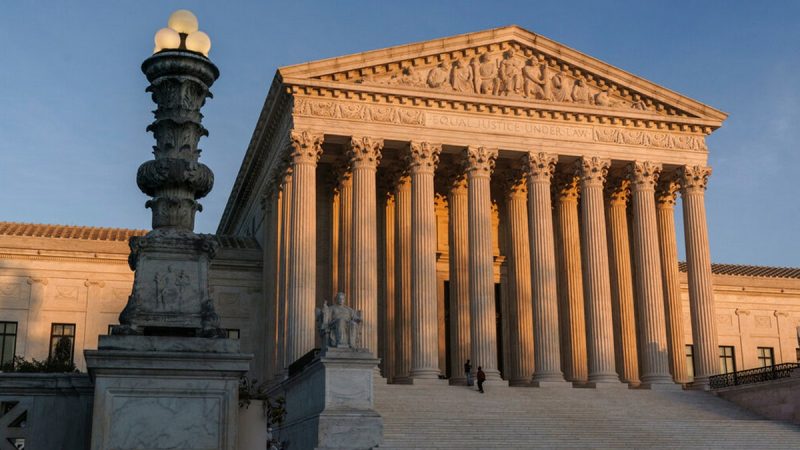A Washington state couple’s nearly $15,000 tax bill was debated by the Supreme Court on Tuesday, in a case the Biden administration says could have ‘far-reaching consequences,’ potentially costing the government more than $5 trillion.
At issue is whether Congress has authority to tax people and companies for sums that have not yet been received, or ‘realized,’ as income.
The current case may be relatively small in scope, but the high court was told its eventual ruling could have an enormous impact on taxing the wealthiest Americans who shield their earnings through a variety of investment loopholes.
SUPREME COURT DISMISSES CASE IMPACTING ACCESSIBILITY INFORMATION ON HOTEL WEBSITES
In a lively two hours of oral arguments, the high court heard claims that its decision would cause financial chaos, upend much of the federal tax code, and derail a so-called ‘wealth tax’ that has been promoted by some Democrats, but has not yet been enacted.
The justices appeared cautious about issuing a sweeping ruling, and instead seemed ready to uphold the current tax on unrealized foreign income.
‘We don’t have to agree with you on that for you to prevail,’ said Justice Brett Kavanaugh on the implications of a sweeping decision, telling Solicitor General Elizabeth Prelogar that the government could win on narrow grounds.
‘Why is it that you think we can decide for you without putting any of those kinds of very established taxation schemes at risk?’ Justice Elena Kagan asked the lawyer for the investors.
Charles and Kathleen Moore, a retired couple from Redmond, Washington, are challenging taxes on their 13% minority shareholder stake in KisanKraft, an Indian corporation that supplies power tools to small farms in that Asian country.
The married couple says the company reinvested its earnings to expand the business rather than distribute dividends or payments to its stakeholders, and therefore should not be considered taxable income.
‘If you haven’t received any income, how can you be required to pay income taxes?’ Charles Moore says in a video from the Competitive Enterprise Institute, a libertarian group representing the couple in court. ‘It seemed, to both of us, unconstitutional.’
The specific provision in question was part of a massive 2017 corporate tax overhaul passed by Congress and signed into law by then-President Trump.
A one-time levy – known as the ‘mandatory repatriation tax’ – is imposed on deferred earnings of American shareholders in foreign corporations, even any gains that have not been ‘realized’ or passed on to them. It was imposed as an offset to other tax benefits.
SUPREME COURT HEARS ARGUMENTS IN $6 BILLION PURDUE PHARMA SETTLEMENT THAT WOULD GRANT IMMUNITY TO SACKLERS
The IRS says that provision could reap the government $340 billion over ten years.
The provision was designed to address one of several workarounds investors have relied on for years to access unrealized investment property, before receiving it and paying taxes on it.
Groups supporting the government say while the Moores may not have received any actual money, their initial $40,000 foreign investment has increased over the years to more than a half-million dollars.
More broadly, groups like the U.S. Chamber of Commerce supporting the Moores’ situation say this case could be applied as a preemptive strike against any wealth tax on the assets of the richest Americans, including stocks that are only taxed when they are sold.
Senator Elizabeth Warren (D-Mass.) has championed such a tax for years. Just last week, Senate Finance Committee Chairman Ron Wyden (D-OR) led a group of 15 fellow Democrats to introduce the Billionaires Income Tax.
And President Biden has suggested a version of a ‘billionaire’s tax’ on U.S. households worth more than $100 million to pay a minimum of 25% on capital gains each year, whether those assets were sold for a profit or still held by them.
But none of the justices publicly expressed enthusiasm about venturing down that path, suggesting any consideration of a wealth tax or other IRS provisions is off the table.
The arguments focused instead on how a narrow ruling could be crafted, with Justice Sonia Sotomayor saying, ‘I don’t fault the parties for shooting for the stars but I guess the tenor of the questions is that nobody’s happy with anybody’s definition of anything, okay?’
The Moores’ appeal prompted one of the largest series of amicus briefs filed with the high court from a variety of interest groups and lawmakers.
Concerns were expressed over how a ruling would affect other longstanding tax provisions – including business partnerships, real estate investments, and charitable and philanthropic donations.
An underlying ethics question has dogged the Supreme Court’s consideration of the tax case.
Senate Judiciary Committee Democrats urged Justice Samuel Alito to recuse, because lawyer David Rivkin representing the Moores also co-conducted four hours of Wall Street Journal opinion page interviews with the justice.
Alito in a four-page statement in September refused to step aside.
‘There is no valid reason for my recusal in this case,’ he wrote. ‘We are required to put favorable or unfavorable comments and any personal connections with an attorney out of our minds and judge the cases based solely on the law and the facts. And that is what we do.’
Alito was an active questioner in the Moore case.

